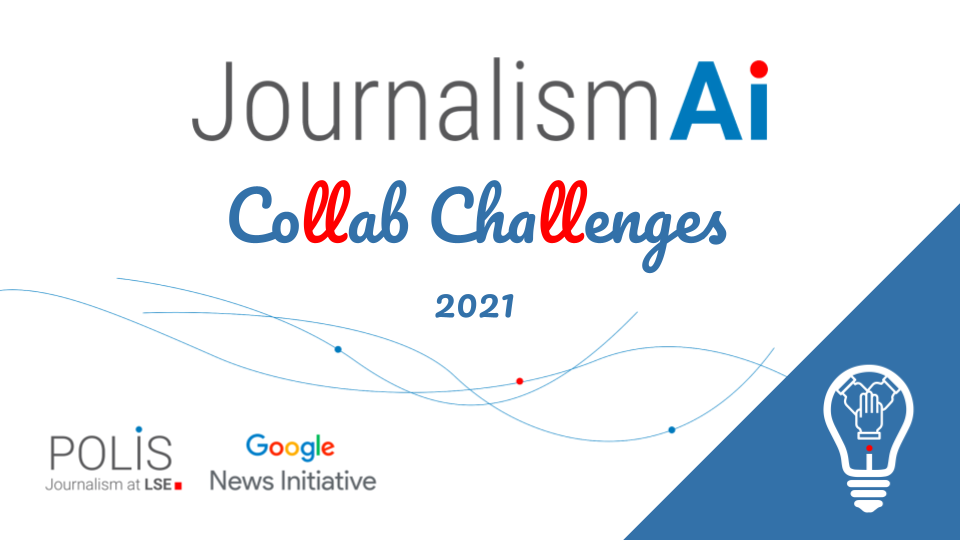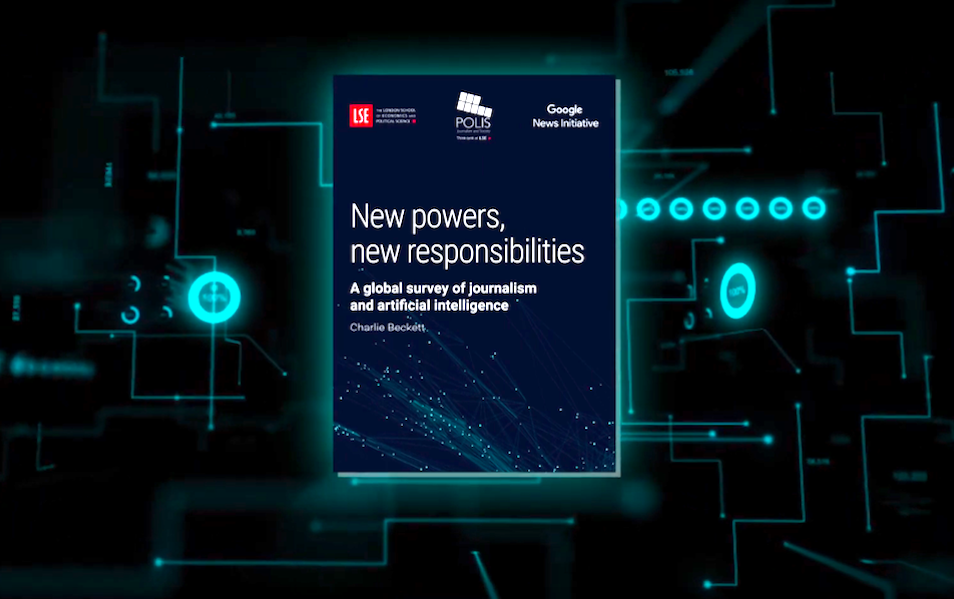What is the mission of JournalismAI? In its first two years, we described the project – a partnership between POLIS at LSE and the Google News Initiative – as “a global initiative that aims to inform media organisations about the potential offered by AI-powered technologies.” But already by last year, we were doing more than that.
The international collaborations we coordinated in 2020 were serving an additional purpose. Rather than being just focused on “informing” media organisations of the power of AI, the Collab allowed media organisations to explore for themselves, together, how they could use AI technologies to approach a series of challenges.
As we start the third year of JournalismAI, we want our mission and objectives to accurately represent the vision that drives our activities. We have a responsibility to support our growing network of almost 3,000 journalists from across the world in learning how to use AI to improve their journalism. They want to know how their organisations can adopt and implement these new technologies to make their business more sustainable and to investigate the impact AI is having on the future of journalism.
In this article, we share our goals for 2021 and how they guided us to draft a new mission statement. We present some of the activities we are planning for this year and introduce the two talented people who are joining the team to help us achieve our expanded goals.
Connect, facilitate, and support
In its first year, JournalismAI had a clear mission: listen to news organisations from across the world to understand the challenges and opportunities presented by the adoption of AI-powered technologies. The insights gathered through the research phase informed the design of our activities in 2020. They encouraged us to focus on creating training resources to help journalists understand the power of machine learning, and on promoting collaboration between media organisations.
We received enthusiastic feedback, the global network has grown way beyond our expectations, and everything seemed relatively straightforward. And it’s when that happens that you’d better stop and ask yourself: Why are we doing what we do? What is making it successful? And how can we improve it to make a greater positive impact on the communities we want to serve? Asking ourselves these questions led us to think even deeper about our mission. So these are our goals for this year:
- We want to further grow our network and inform as many journalists as possible about the potential of AI. In particular, we want to reach new journalism communities in the so-called ‘Global South’ and diversify our network to add new perspectives.
- We aim to facilitate connections between journalists and news organisations to create new opportunities for knowledge exchange and harness the power of our global community.
- We want to mitigate the inequalities described in the 2019 report, supporting small and medium organisations via targeted initiatives that will help them benefit from the potential offered by AI technologies.
- We want to make our resources more accessible so that they can more easily be discovered and explored. We strive to offer actionable takeaways to inform newsrooms’ adoption and implementation of AI-powered tools and processes.
We will do all of the above with our distinctive open and transparent approach. We are convinced that JournalismAI has no competitors, only potential collaborators.
Conscious of our Western bias – after all we started with a small team of two out of London, UK – we aim to partner with journalism organisations across the world to allow their understanding of regional media landscapes to inform our approach and tailor our support to the local needs and priorities.
Ultimately, we aim to create opportunities for journalists and media organisations to come together and explore what solutions can be designed to improve the future of journalism with AI. We are on a mission to inform media organisations about the potential offered by AI-powered technologies and to foster debate about the ethical, editorial, and social impact on AI for journalism.
Training, experiments, and opportunities for debate
How do you translate new goals and a new mission into activities that make an impact? Once again, we are letting the voice of our global community take the driver’s seat.
Our community survey offers us key insights on what journalists and newsrooms come to us for and what they hope to see us doing more this year to support them. (Feel free to fill it in if you haven’t yet!). And the extensive and detailed feedback of the participants of the 2020 Collab gives us plenty of clues to what elements of the programme we should improve to deliver tangible results with a collaborative approach. As a result of what we are hearing from the community, we are designing the following initiatives:
Soon we will launch the Collab Challenges, a new series of international collaborative experiments for newsrooms that want to explore innovative AI-powered solutions. This is an evolution of the concept of the 2020 JournalismAI Collab and a unique opportunity for news organisations to explore AI’s potential together. If your company is interested in taking part, contact us and let’s talk. [Find the contact details at the end of the article.]
We are designing a free training programme for small newsrooms that want to experience a deep-dive into the world of AI and understand how these new technologies affect every step of the reporting process and the business of journalism.
In collaboration with Agnes Stenbom, Responsible AI Specialist at Schibsted and a PhD Candidate at KTH Royal Institute of Technology, we are conducting a research study on inter-organisational collaboration. The research is based on the feedback shared by the participants of the 2020 Collab, who completed an extensive survey at the end of last year.
After the success of our very-first JournalismAI Festival, we will host a second edition at the end of 2021 to celebrate again the most exciting developments of the year at the intersection of journalism and artificial intelligence.
And we are working behind the scenes to create new opportunities to bring our community together to exchange best practices and continue the conversation on the ethical, editorial, and social impact of AI for journalism.
To achieve ambitious goals, you need an ambitious team
Can that small team of two out of London achieve all of the above? Of course not. And that’s why we are excited to announce that two talented professionals are joining the JournalismAI team, sharing the role of Community Coordinator: Sabrina Argoub and Lakshmi Sivadas.

Born in Italy, Sabrina [pictured on the left] comes from a Moroccan family. She is a graduate of the Political Communication and Journalism program at the University of Amsterdam. She worked at The Correspondent as Production editor where she coordinated and overviewed the editorial team and curated the platform live events. Sabrina is based in Turin, Italy.
Lakshmi [pictured on the right] is a graduate of the Craig Newmark Graduate School of Journalism at CUNY. Previously, she worked at StoryCorps, where she helped identify expansion opportunities for StoryCorps’ latest initiative, One Small Step. She also covered urban issues including the environment and real estate for NDTV, and was an assistant producer at CNBC in India where she helped produce two primetime, award-winning daily news shows. Lakshmi is based in Bangalore, India.
We couldn’t be more excited to have Lakshmi and Sabrina joining the JournalismAI team and enriching it with their unique skills and experiences, which will be critical to achieving the ambitious goals that the project aims to achieve in its third year.
Stay tuned
If you are interested in following the JournalismAI activities throughout the year, the best way to stay updated is to sign up for our monthly newsletter. You can also join our Telegram channel to meet and exchange ideas with other members of our global community. Follow @PolisLSE on Twitter for daily updates, and if you have any questions about the project, contact Mattia at M.Peretti@LSE.ac.uk







